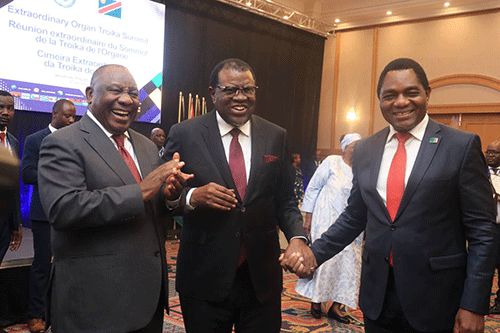The Southern African Development Community extraordinary troika summit of heads of state and government yesterday discussed the political and security situations in the region.
It resolved to keep Eswatini, Mozambique, Democratic Republic of Congo on the agenda for further discussions to bring about peace in those member countries.
Delivering the communique, Executive Secretary of SADC, Elias Magosi noted the summit urged the Kingdom of Eswatini government to urgently initiate the process of national dialogue and urged all stakeholders in the region to remain calm and participate peacefully in the national dialogue.
“Summit condemned all killings and damage to property in the Kingdom of Eswatini, reiterated by SADC’s condemnation of the killing of Thulani Maseko, a leading human rights lawyer and political activist in the Kingdom of Eswatini, who, at the time of his death, was chairperson of the Multi-Stakeholder Forum, and urged the government to conduct a swift, transparent and comprehensive investigation into the killing of Maseko,” stated Magosi after a long meeting that ended late yesterday.
The two-day summit concluded yesterday
in Windhoek and was chaired by President Hage Geingob in his capacity as the chairperson of the organ on politics, defence and security cooperation.
The summit further noted with deep concern the unstable security situation in the eastern part of the Democratic Republic of Congo (DRC) and strongly condemned the upsurge of conflicts and activities of armed groups, including M23 rebels and the support provided to the armed groups by foreign forces. The summit further resolved to initiate dialogue amongst the member states of different regional economic communities (RECs) that have deployed forces in the DRC to establish and implement mechanisms for the effective coordination
of their interventions in the DRC.
The meeting was preceded by the ministerial committee meeting held on the opening day, Monday.
The troika comprises Namibia (current chair), Zambia (incoming chair) and South Africa (former chair).
The meeting considered, shared views and took decisions on specific political and security issues in the SADC region. It also received a progress report on the SADC Mission in Mozambique (SAMIM) and recommendations therefrom. It also received reports on the political and security situations in the Kingdoms of Eswatini, Lesotho, and
the Democratic Republic of the Congo.
According to Magosi, member states were called to urgently respond to requests for critical capabilities to enhance the operational capability of the SAMIM.
“Summit noted the ongoing investigations being undertaken by the SAMIM leadership following a disturbing video clip circulating on social media depicting what appears to
be SAMIM personnel burning deceased people and reiterated that the public will be informed once the investigations are completed,” he added.
The SAMIM was deployed on 15 July 2021, in Cabo Delgado Province as a regional response to support that country to combat terrorism and acts of violent extremism.
Chairing his first meeting, Geingob said in his opening statement regrettably, and whilst the region is focused on the Kingdom of Eswatini to find and implement peaceful solutions to these challenges, there have been ongoing and sporadic acts of violence in the country that point to an escalation of the tensions.
“I have said that when diplomacy fails and people stop talking to each other, conflict begins. Therefore, dialogue is important as it will allow the peace process to become successful. As leaders of SADC seized with the well-being and welfare of close to 400 million citizens, we are called upon to reinvent new approaches to find solutions to old problems that have been troubling our region for so long,” said the President.
At the opening occasion, Magosi noted peace, security and political stability are the foundation for socio-economic development.
“It is for this reason that the region continues to pay particular focus on strengthening political cooperation, and enhancing democracy, good governance, the rule of law, human rights, and human security in line with the SADC Vision 2050,” stressed Magosi.
According to him, SADC remains committed to addressing the political and security situation in the region. Magosi
added without peace and security in the region, it will be difficult to focus on the implementation of regional strategies and priorities as well as attain the SADC Vision 2050. SADC is a regional economic community comprising 16 member states.
The mission of SADC is to promote sustainable and equitable economic growth and socio-economic development through efficient, productive systems, deeper cooperation and integration, good governance and durable peace and security; so that the region emerges as a competitive and effective player in international relations and the world economy.



